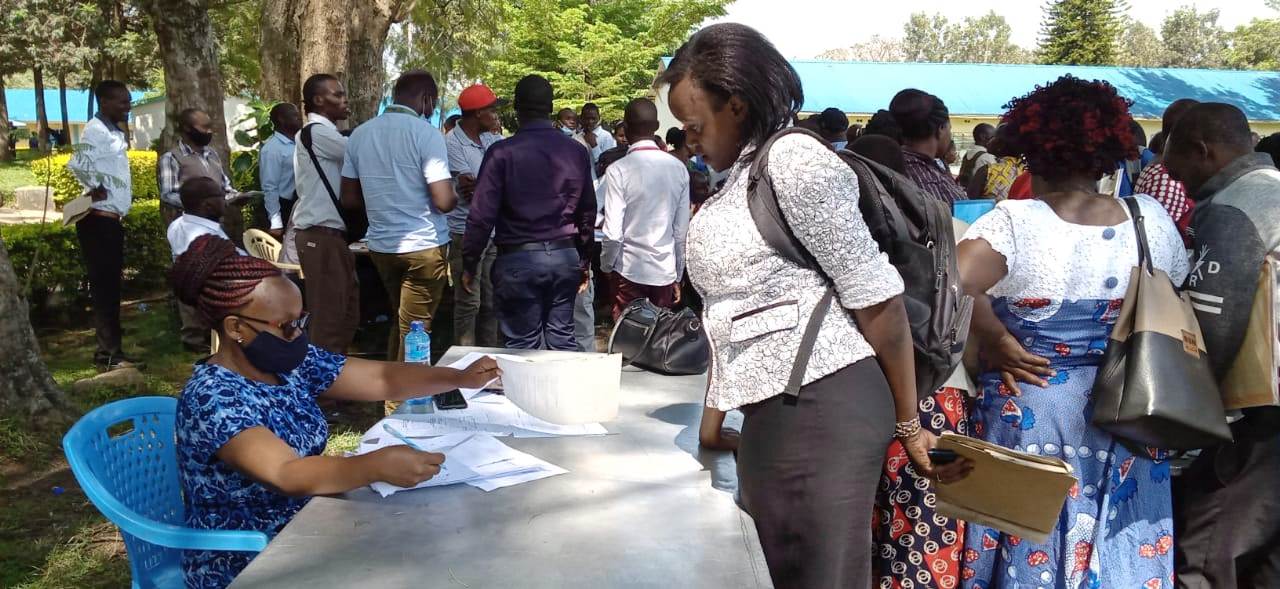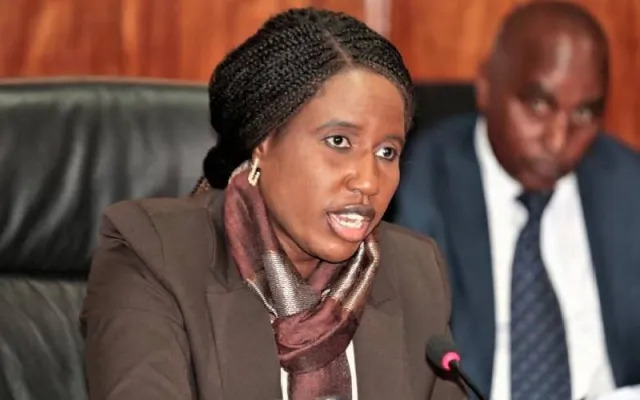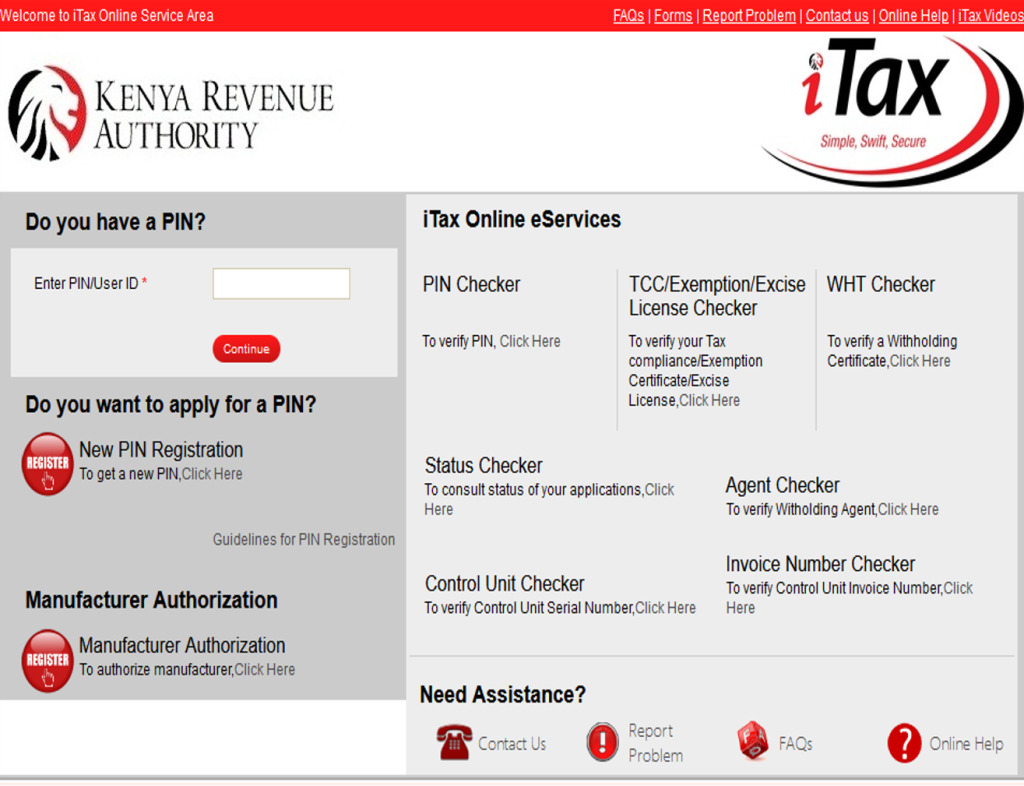By our reporter
A decision by the Teachers Service Commission (TSC) to apply an affirmative action plan in the recent recruitment exercise conducted across the country has caused more confusion among field officers overseeing the process.
The well-intentioned efforts by the commission to achieve the stipulated 5% threshold on teachers classified under People Living with Disabilities (PLWDs) within its ranks through this hiring exercise seems to have put county directors, sub-county directors and curriculum support officers in an awkward position.
According to TSC new guidelines seen by Education News released by the Commission’s Secretary and Chief Executive Officer (CEO) Dr. Nancy Macharia, field officers who include TSC regional, county and sub-county directors along with head teachers and principals, were required to shortlist five applicants per advertised vacancy drawn from a merit list developed by the TSC headquarters.
In the guidelines outlined under Circular No. 9/2022 dated June 30, 2022, the Commission directed the TSC county directors to ensure that 5 per cent of all the advertised slots in both primary and secondary schools are reserved for teachers with disabilities in accordance to the provisions of the Constitution.
The officers were however advised to ensure that only those who present disability cards obtained from the National Council for Persons with Disabilities (NCPD) were eligible for consideration under this affirmative action.
Similarly, the Commission directed the officers that where an applicant with disability is within the shortlisted five in the merit list, then such a candidate should be considered for employment even though the others within the list had better scores.
Field officers are now raising questions over the wisdom behind this requirement as it ridicules the whole recruitment exercise. Those who spoke to Education News in confidence wondered why they were required to interview applicants when the results were already predetermined.
“What was the essence of asking the field officers to conduct interviews and shortlist applicants if those with disabilities had to be employed irrespective of their scores? Some successful candidates left the venue distraught because they felt they were ‘robbed’ due to an unfair advantage,” said a deputy director in one of the counties.
The field officials stated that there was already an affirmative action plan in place within the recruitment guidelines which were in force before and covered the needs of teachers living with disability as captured in Appendix 1(b), which gave the directions on how to score the applicants in various categories during the interviews.
“Affirmative action on applicants with disability was first applied during shortlisting and secondly by use of special score guide 1(B) and finally in case of a tie. How will the panel convince an applicant who scores higher than one with disability that he or she is unsuccessful?” One field officer quipped.
Under the previous arrangement, applicants with disability who had a First Class and Second Class honours in Bachelor of Education (BED) were awarded 40 marks directly while those with a pass apportioned 35 marks.
Applicants with disability challenges who possess Bachelors of Arts (BA) and Science (BSC) with a Post Graduate Diploma in Education (PGDE) also earned the same marks during interviews.
But for those without disabilities, the previous guidelines provided that First Class holders be awarded 40 marks, Second Class, 35 marks and Pass, 30 marks. The same rule would apply for those with PGDE qualifications.
“Any deviation from the guidelines should be backed by a written communication to avoid burning our fingers,” warned one officer who spoke to Education News.
Teacher Union officials also protested over what they termed as unfair rules and asked the Commission to review its new policy on recruitment.
Teachers have also raised concerns over failure by the TSC to fully recognize experience in the new guidelines as was the case before. Teacher Unions are now claiming that interns and those employed under the Boards of Management of schools (BOMs) were not awarded higher marks in the recruitment score sheets as was the case before.
Under the new system, secondary school intern teachers with three year experience were given a total of 15 marks. Those with two year experience were awarded 10 marks while those who have served for one year were given only 5 marks. This is a deviation from the past when intern teachers were awarded automatic 30 marks.
The Kenya Union of Post Primary Education Teachers (KUPPET) Samburu Branch Executive Secretary William Lengoyiap said that intern teachers and those serving under the employment of the Board of Management (BoM) should have been given the first priority.
According to Lengoyiap, they have received several complaints that the shortlisting process done at the TSC headquarters was unfairly done and they shall bring all these matters before the Commission to find a resolution.
“It is now clear that the recruitment that is going on or completed has been marred with serious malpractices. TSC has messed up this recruitment by doing centralized shortlisting to put people of their choice up there and make the guidelines suit them, locking out potential and deserving candidates. It is unacceptable, fraudulent and illegal,” said Lengoyiap.
He added: “For this we advise all our teachers who have qualified, applied and have failed to be in the short list to register their formal complaints with the TSC Director’s office and copy us the same.”
His Vihiga counterpart Sabala Inyeni also criticized the recruitment process, pouring cold water on the plan by TSC to develop a data bank for unemployed graduates.
“This guideline has made it difficult for an intern to get direct employment. We are appealing to TSC to revert to the system they have been using where an intern had an outright advantage in the recruitment process,” said Sabala.
He added: “We are also informed that the Commission intends to set up a data bank which they will now be using to post new teachers. This is a sure way of opening the hiring process to corruption cartels at TSC.”
Post-primary teaching vacancies attracted the highest number of applicants with 219,311 teachers applying for the 4,000 new vacancies while out of 1,000 advertised posts for primary schools, the Commission received 136,833 applications.
A total of 8,230 vacancies were also up for grabs to replace teachers who have exited service through natural attrition with the vacancies being in primary schools (6,539) and post-primary institutions (1,691).
Through affirmative action, TSC advertised for some positions specifically targeting ASAL areas such as Mandera, Garissa and Wajir, among others, which are heavily understaffed. The Commission intends to deploy a total of 1,230 teachers to the regions.
The competition for teaching jobs has increased significantly over the years owing to the high number of graduates churned out from colleges and universities. In mid-July this year, the Commission listed over 356,000 jobless teachers who were seeking only 14,000 vacancies it advertised.






